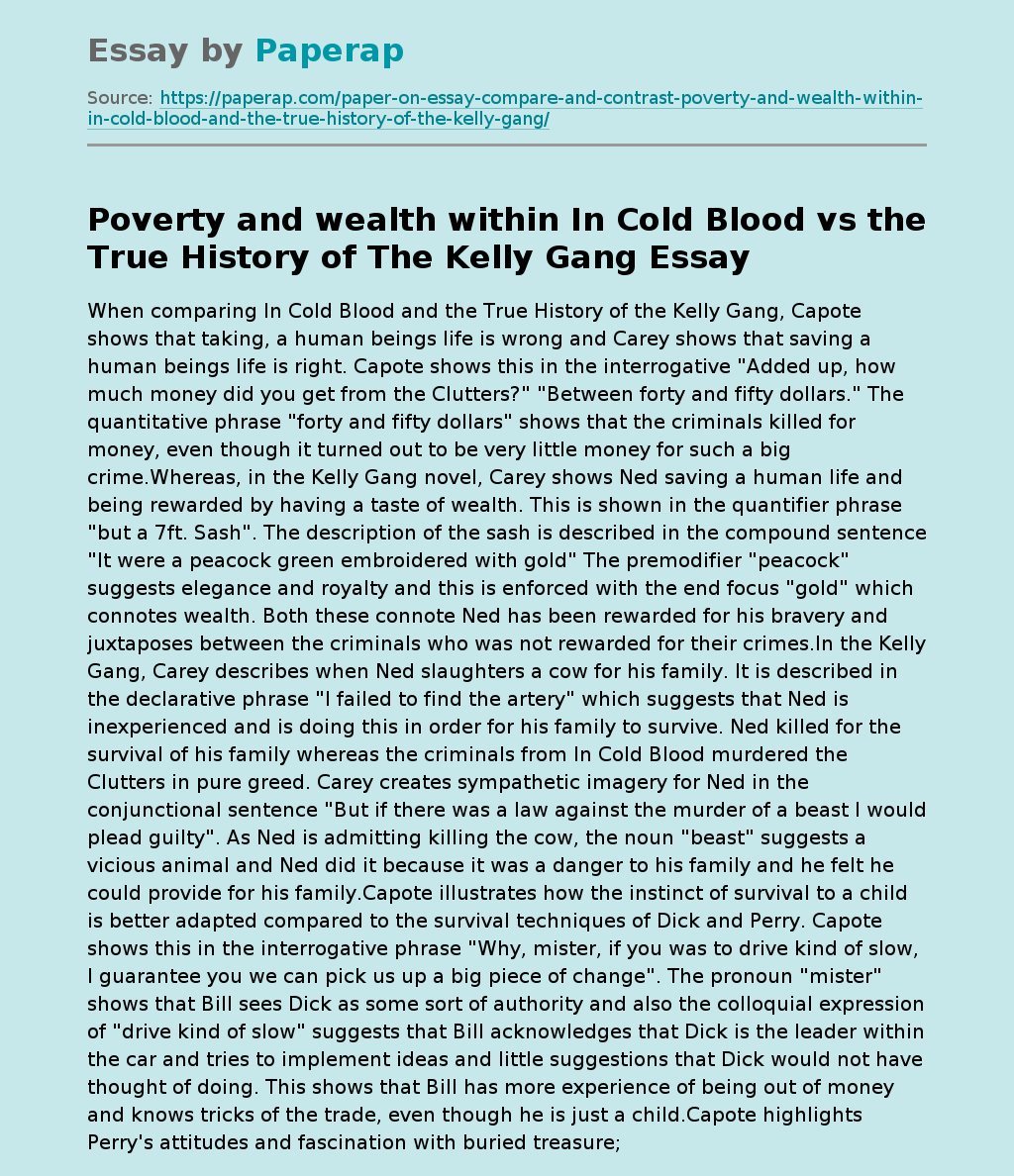Poverty and wealth within In Cold Blood vs the True History of The Kelly Gang
The following sample essay on In Cold Blood and the True History of the Kelly Gang, Capote shows that taking, a human beings life is wrong and Carey shows that saving a human beings life is right. Capote shows this in the interrogative “Added up, how much money did you get from the Clutters?” “Between forty and fifty dollars.” The quantitative phrase “forty and fifty dollars” shows that the criminals killed for money, even though it turned out to be very little money for such a big crime.
Whereas, in the Kelly Gang novel, Carey shows Ned saving a human life and being rewarded by having a taste of wealth. This is shown in the quantifier phrase “but a 7ft. Sash”. The description of the sash is described in the compound sentence “It were a peacock green embroidered with gold” The premodifier “peacock” suggests elegance and royalty and this is enforced with the end focus “gold” which connotes wealth. Both these connote Ned has been rewarded for his bravery and juxtaposes between the criminals who was not rewarded for their crimes.
In the Kelly Gang, Carey describes when Ned slaughters a cow for his family. It is described in the declarative phrase “I failed to find the artery” which suggests that Ned is inexperienced and is doing this in order for his family to survive. Ned killed for the survival of his family whereas the criminals from In Cold Blood murdered the Clutters in pure greed. Carey creates sympathetic imagery for Ned in the conjunctional sentence “But if there was a law against the murder of a beast I would plead guilty”.
As Ned is admitting killing the cow, the noun “beast” suggests a vicious animal and Ned did it because it was a danger to his family and he felt he could provide for his family.Capote illustrates how the instinct of survival to a child is better adapted compared to the survival techniques of Dick and Perry. Capote shows this in the interrogative phrase “Why, mister, if you was to drive kind of slow, I guarantee you we can pick us up a big piece of change”. T
he pronoun “mister” shows that Bill sees Dick as some sort of authority and also the colloquial expression of “drive kind of slow” suggests that Bill acknowledges that Dick is the leader within the car and tries to implement ideas and little suggestions that Dick would not have thought of doing. This shows that Bill has more experience of being out of money and knows tricks of the trade, even though he is just a child.Capote highlights Perry’s attitudes and fascination with buried treasure; this is shown by the simple sentences “Diamonds. Buried treasure. Wake up, little boy. There ain’t no caskets of gold. No sunken ship. And even if there was – hell you can’t even swim”. The noun “diamonds” suggests that Perry was dreaming over desirable items such as diamonds and that he fantasises that he will be wealthy. In addition, Capote shows the realism of Perry actually becoming wealthy through Dicks voice.
The imperative “wake up, little boy” suggests that Dick finds Perry’s fantasy’s unrealistic and childish, and also the modifier “little” the noun “boy” reemphasises the fact that Dick finds Perry’s dreams childish and it shows he has lived in the real world and knows that you need to make the effort to actually make money and be successful.Carey shows the reader that from birth – Ned is poor; Ellen Kelly sells her son to Harry Power in order to overcome poverty. Sympathy is created for the Kelly Family in the interrogative phrase “You mean we will have a yarn? More in the nature of a ride”. The comparative “more” suggests that Mrs Kelly is bending the truth and not telling Ned everything. This shows that Mrs Kelly really regrets her decision but still thinks it would be beneficial to the rest of the family, to keep them from poverty.Capote conveys Bill’s superior intelligence over Dick and Perry and his experience with the refund money. It is shown in the colloquial phrase “they don’t give no refund on liquor empties’, the boy informed him.
” The double negative “don’t give no refund” suggests colloquial language, which can be related to Bills background, and suggesting that he is poor for the reason of where he is from. Also the use of the pronoun “they” suggests a gap between con artists and criminals and the general honest public, this suggests that Bill and his grandfather are outcasts, which shows that the outcasts are associated with poverty. This is also portrayed in the adverbial phrase “sometimes they try to cheat”. The dynamic verb “try” suggests that Bill is experience and cannot be out smarted. In addition, the verb “cheat” juxtaposes their actions, as Bill and his grandfather are cheating business out of money.From looking at both texts, you can see that the honest hardworking people are the ones who have the wealth and happiness and the outcasts and criminals are the ones who suffer in poverty. This can be contradictory however, they maybe outcasts and criminals because they in poverty.
Poverty and wealth within In Cold Blood vs the True History of The Kelly Gang. (2019, Mar 19). Retrieved from https://paperap.com/paper-on-essay-compare-and-contrast-poverty-and-wealth-within-in-cold-blood-and-the-true-history-of-the-kelly-gang/

